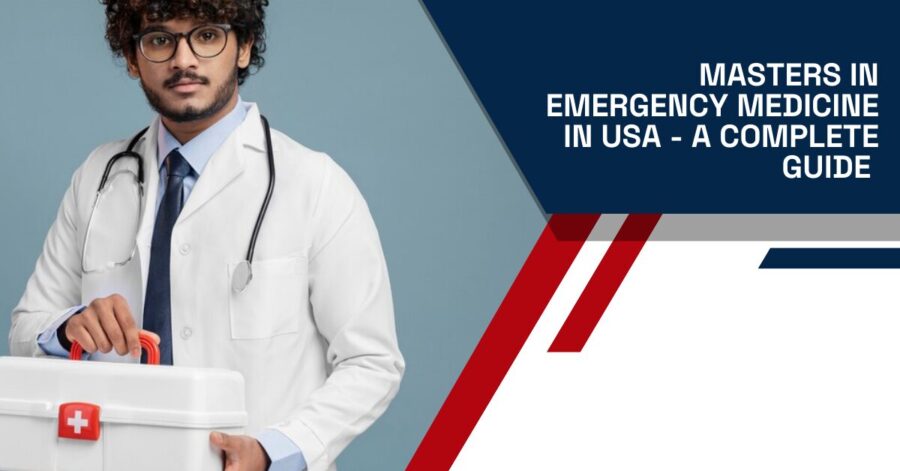17 December 2024
9 minutes read
Masters in Emergency Medicine in USA- A Complete Guide

KEY TAKEAWAYS
- MEM programs blend academic coursework with clinical training, emphasizing trauma, disaster response, and cardiac support.
- Led by seasoned professionals, these programs offer mentorship and advanced emergency care skills.
- MEM graduates can pursue diverse roles in emergency care, disaster management, and more.
It takes a combination of knowledge, skill, and perseverance to succeed in the fascinating, dynamic, and quick-paced field of emergency medicine. In the United States, the demand for specialized medical professionals trained in handling acute health crises is on the rise. Let’s dive into the complex world of emergency medicine, exploring its importance, the various programs available, and the pathways toward a fulfilling career in this crucial healthcare sector.
Emergency Medicine: The Crux of Immediate Healthcare
The area of medicine known as emergency medicine is committed to the rapid diagnosis and care of accidents and acute illnesses. From handling severe chest pain and strokes to managing accidents and trauma, the role of emergency medicine is pivotal in the healthcare ecosystem.
One’s medical career may be drastically altered by their decision to concentrate on emergency medicine. It opens the door to a dynamic working environment where there are no two days that are the same and the satisfaction of actually changing someone’s life daily is a reality.
Importance of a Masters in Emergency Medicine
Among the various programs in emergency medicine, the Master’s in Emergency Medicine (MEM) is highly sought after. This degree offers intensive training designed to provide a firm foundation in emergency medicine. It covers a wide array of topics, from advanced trauma management and paediatric emergencies to disaster medicine and research methodology. The MEM degree focuses on enabling students to manage complex emergencies with confidence. The curriculum combines academic rigor with practical application, preparing students to handle real-world medical emergencies efficiently.
A Master’s in Emergency Medicine (MEM) can give you a considerable professional advantage if you’re looking to work in emergency medicine. This extensive course provides in-depth information on diagnosing and treating a variety of medical situations. Furthermore, it exposes students to diverse clinical settings, helping them to adapt and excel in challenging situations.
Emergency physicians are trained to manage a wide range of medical emergencies and are skilled in performing procedures such as intubation, chest tube placement, and central line insertion. The program in emergency medicine is designed to hone the student’s clinical skills, enhancing their ability to make rapid, accurate assessments and initiate immediate management for patients. This program encourages students to take on leadership roles in emergency medical care, making life-saving decisions under pressure.
QUICK TIP!
Choose a MEM program that aligns with your career aspirations and offers relevant specializations.
Top Universities for MEM in the USA

Here’s a detailed table of top universities for Masters in Emergency Medicine in the USA, including program highlights, duration, specializations offered, unique features, and fee structure per annum:
| University Name | Program Highlights | Duration | Specializations Offered | Unique Features | Fee Structure / Annum |
|---|---|---|---|---|---|
| George Washington University | Comprehensive curriculum, strong clinical focus | 2-3 years | Paediatric EM, Disaster Medicine | Partnerships with leading medical centres | $60,000 |
| University of California, Los Angeles (UCLA) | Diverse faculty, research opportunities | 2 years | Toxicology, Sports Medicine | Cutting-edge research facilities | $55,000 |
| Johns Hopkins University | Emphasis on global health and leadership | 2-3 years | Critical Care, EMS | Opportunities for international rotations | $65,000 |
| Harvard University | Interdisciplinary approach, renowned faculty | 2 years | Health Policy, Biomedical Ethics | Collaboration with Harvard-affiliated hospitals | $70,000 |
| Stanford University | Innovation in emergency care, technology integration | 2 years | Wilderness Medicine, Geriatric EM | Access to Silicon Valley’s resources | $68,000 |
Choosing the Right Program in Emergency Medicine
Selecting the most suitable emergency management program requires careful consideration. Prospective students should research thoroughly, focusing on the curriculum, teaching methodology, faculty expertise, and opportunities for hands-on experience.
You might also want to consider factors like course duration, tuition, and the reputation of the institution. For example, George Washington University’s Department of Emergency Medicine offers an acclaimed program known for its advanced learning resources and distinguished faculty.
Certainly! Here’s a detailed table comparing different aspects of Emergency Medicine programs in the USA:
| University/Hospital | Program Name | Accreditation | Curriculum & Training | Resources & Facilities | Location | Resident Support | Research & Academic Opportunities |
|---|---|---|---|---|---|---|---|
| Johns Hopkins University | Emergency Medicine | ACGME | Comprehensive training: trauma, critical care, etc. | Well-equipped EDs, simulation centres, research | Baltimore, Maryland | Robust resident support | Strong emphasis on research, mentorship |
| Massachusetts College of Pharmacy and Health Science | Emergency Medicine | ACGME | Broad-based curriculum: critical care, ultrasound | State-of-the-art EDs, simulation centres, research | Boston, Massachusetts | Extensive resident support | Active research environment, scholarly opportunities |
| University of California | Emergency Medicine | ACGME | Rotations: urban, community, county EDs, diversity | Leading-edge EDs, simulation centres, research | San Francisco, CA | Strong resident support | Opportunities for research, focus on health determinants |
| Mayo Clinic | Emergency Medicine | ACGME | Comprehensive training: trauma, critical care, etc. | State-of-the-art EDs, simulation centres, tech | Rochester, MN; Phoenix, AZ; Jacksonville, FL | Extensive resident support | Strong research infrastructure, involvement in research |
| Stanford University | Emergency Medicine | ACGME | Broad curriculum: trauma, critical care, global health | Well-equipped EDs, simulation centres, research | Stanford, CA | Comprehensive support | Robust research opportunities, innovation, technology |
Programs in Emergency Medicine- An Array of Options
Apart from the MEM, several other programs cater to various career goals in the field of emergency medicine. There are also specialized training programs for emergency physicians, undergraduate degrees in emergency medicine and surgery, and subspecialty fellowships in fields like toxicology, paediatric emergency medicine, and emergency medical services (EMS).
Each program is designed with a specific focus and offers unique learning outcomes. For instance, a residency program in emergency medicine emphasizes experiential learning in a clinical environment, preparing graduates for high-stakes, high-pressure roles in emergency departments.
| Program | Degree | Duration | Focus |
|---|---|---|---|
| Emergency Medicine Residency | MD | 3 years | Clinical experience, preparation for high-stress roles |
| Emergency Medicine Fellowship | MD | 1-2 years | Advanced training in specific subfield of emergency med |
| Emergency Medical Services Fellowship | MD | 1 year | Advanced training in EMS, operations and management |
| Paediatric Emergency Medicine Fellowship | MD | 3 years | Care of critically ill children, paediatric emergencies |
| Emergency Nursing Program | RN | 2 years | Assessment, treatment of medical emergencies |
| Emergency Medical Technician Program | Cert | 3-6 months | Basic life support, first aid, emergency medical care |
QUICK TIP!
Utilize networking opportunities and mentorship from faculty to advance your career in emergency medicine.
Specializations in Emergency Medicine
Specializations within emergency medicine provide advanced training in specific areas, enhancing the skill set and career opportunities for professionals. Here are some key specializations:
- Paediatric Emergency Medicine: Focuses on the acute care of infants, children, and teenagers.
- Toxicology: Deals with the treatment of patients exposed to toxins, including drug overdoses and poisons.
- Emergency Medical Services (EMS): Centres on pre-hospital emergency care and coordination of emergency medical response.
- Disaster Medicine: Prepares professionals to manage medical aspects of disaster response and recovery.
- Ultrasound: Utilizes ultrasound technology for diagnostic purposes in emergency settings.
- Sports Medicine: Addresses acute and chronic injuries sustained in sports and physical activities.
- Critical Care Medicine: Involves the management of life-threatening conditions in the intensive care unit.
- Geriatric Emergency Medicine: Specializes in the emergency care of older adults, considering their unique needs.
- Wilderness Medicine: Focuses on medical care in remote and wilderness environments, often under challenging conditions.
- International Emergency Medicine: Develops skills for practicing emergency medicine in diverse international settings, often with resource limitations.
Faculty Insights
Behind every successful program lies a team of dedicated and experienced faculty members. These educators play a crucial role in shaping the students’ learning journey, guiding them through complex medical scenarios, and offering real-world insights from their clinical practice.

Professors and mentors are often seasoned emergency medicine physicians who bring a wealth of clinical experience to the classroom. They provide crucial soft skills like decision-making, teamwork, and communication, which are vital in the fast-paced field of emergency medicine, in addition to teaching students how to diagnose and manage medical emergencies.
Syllabus and Structure
A well-rounded syllabus is the backbone of a good MEM program. The curriculum typically includes subjects like trauma and resuscitation, cardiology, toxicology, and emergency medical services. This range equips students with the knowledge and skills needed to respond effectively to various medical emergencies. The course structure often includes lectures, interactive seminars, clinical rotations, and research projects. This blend of academic and clinical learning ensures students gain a comprehensive understanding of emergency medicine.
| Module/Subject Category | Key Topics Covered | Description | Teaching Method |
|---|---|---|---|
| Foundational Knowledge | Anatomy, Physiology, Pharmacology | Basics of human body systems, drug actions, and interactions | Lectures, online modules |
| Clinical Skills in EM | Trauma Management, Cardiac Life Support, Paediatric EM | Hands-on skills for urgent medical conditions | Simulations, Clinical Rotations |
| Disaster Management | Response to Natural Disasters, Emergency Planning | Training for handling large-scale emergencies | Case Studies, Field Exercises |
| Medical Ethics and Law | Patient Rights, Ethical Decision-Making | Understanding ethical and legal dimensions in emergency care | Seminars, Group Discussions |
| Research Methodology | Data Analysis, Academic Writing | Basics of medical research, including designing studies | Workshops, Research Projects |
| Advanced Specializations | Toxicology, Emergency Medical Services (EMS) | In-depth study in specific areas of emergency medicine | Elective Courses, Clinical Rotations |
| Leadership and Management | Healthcare Systems, Team Leadership | Preparing for leadership roles in emergency settings | Interactive Lectures, Team Projects |
| Technology in EM | Medical Informatics, Telemedicine | Use of technology in enhancing emergency medical care | Online Learning, Practical Applications |
Career Opportunities in Emergency Medicine
Armed with a Master’s in Emergency Medicine, a plethora of career paths lie ahead. Graduates can work in a variety of settings, including hospitals, emergency medical services, and disaster response teams. They may choose to work as emergency medicine physicians, paramedics, or critical care coordinators.
| Job Role | Description | Work Environment | Required Skills & Qualifications | Average Salary (Approx.) |
|---|---|---|---|---|
| Emergency Medicine Physician | Provide immediate care for acute illnesses and injuries | Hospitals, Emergency Rooms | MD or DO, Residency in EM | $300,000 – $400,000 |
| Emergency Nurse Practitioner | Specialized nursing care in emergency settings | Hospitals, Urgent Care Centers | MSN or DNP, Nurse Practitioner License | $100,000 – $120,000 |
| Paramedic | Deliver pre-hospital emergency care | Ambulances, Emergency Response Teams | Paramedic Certification | $35,000 – $50,000 |
| Hospital Administrator | Manage operations and administration in healthcare settings | Hospitals, Healthcare Facilities | Master’s Degree in Healthcare Admin or related field | $100,000 – $150,000 |
| Emergency Management Director | Plan and direct disaster response or crisis management activities | Government Agencies, Nonprofits | Bachelor’s Degree, Emergency Management Certification | $70,000 – $90,000 |
| Medical Researcher in Emergency Medicine | Conduct research to improve emergency healthcare practices | Research Institutions, Universities | Ph.D. in a related field, Research experience | $80,000 – $120,000 |
| Health Policy Analyst | Analyze policies affecting emergency health services | Government, Think Tanks | Master’s in Public Health, Policy, or related field | $60,000 – $80,000 |
| EMS Educator | Train and educate future EMS professionals | Educational Institutions, EMS Academies | Relevant EMS experience, Teaching Certification | $50,000 – $70,000 |
| Disaster Response Coordinator | Coordinate response efforts during emergencies | NGOs, International Organizations | Relevant experience, Project Management skills | $60,000 – $80,000 |
Beyond clinical roles, MEM graduates can also explore opportunities in teaching, research, and administration. They can contribute to the development of emergency medicine as a discipline, influencing policies and practices at a national and international level.
QUICK TIP!
Leverage hands-on training and clinical rotations to build practical skills in emergency care.
Evolution of Emergency Medicine
The discipline of emergency medicine is constantly changing. As medical technology, research, and treatment procedures improve, aspiring emergency medicine doctors need to stay current with the most recent innovations. Success in emergency medicine is largely dependent on ongoing professional development. Many institutions offer ongoing learning opportunities through workshops, seminars, and conferences. Online resources and journals also provide a wealth of up-to-date information for self-directed learning.
Stepping into the Real World: Trauma, Healthcare, and Beyond
The transition from an academic setting to a real-world clinical environment is a significant milestone for MEM graduates. The ability to apply theoretical knowledge to practical situations is a testament to their competence.
In the field, emergency medicine professionals are required to make quick, life-saving decisions. They face a wide range of medical emergencies, from cardiac arrests and strokes to trauma cases and disaster situations.
Their role extends beyond patient care to include communication with patients’ families, collaboration with other healthcare professionals, and often, managing emergency departments.
Becoming a Pioneer: The Path of an Emergency Medicine Physician
The journey toward becoming an emergency medicine physician is not for the faint-hearted. It involves intensive academic study, rigorous clinical training, and continuous learning. Yet, the reward is immense – the ability to make a significant difference in people’s lives during their most critical moments.
As emergency medicine physicians, MEM graduates often assume leadership roles in emergency departments. They are at the forefront of medical advancements, contributing to research and shaping the future of emergency medicine.
The Future of Emergency Medicine
With the increasing recognition of its importance, the field of emergency medicine is set for promising growth. Advancements in technology and research are poised to revolutionize emergency care, offering more efficient and effective treatment options.
From the use of artificial intelligence in diagnosis to the development of cutting-edge resuscitation techniques, the future of emergency medicine is incredibly exciting. As a part of this progressive field, MEM graduates have the opportunity to contribute to these advancements and be at the forefront of healthcare innovation.
Conclusion
A Master’s in Emergency Medicine in the USA is not just a degree – it’s a journey that transforms medical graduates into skilled emergency medicine professionals. It’s an arduous but fulfilling path, offering opportunities for personal growth, professional development, and the immense satisfaction of saving lives.
The field of emergency medicine is a vital pillar of the healthcare system. As an emergency medicine professional, your role goes beyond providing immediate medical attention. You have the power to make a tangible difference, improving patient outcomes and shaping the future of healthcare.
Start your journey today and become a part of this vital field, making a real impact in people’s lives.
Begin your journey to studying in the USA, the land of diverse educational opportunities, with Ambitio. Our platform provides you with the tools and insights to navigate the vast landscape of American universities, helping you find the perfect institution that aligns with your academic goals and aspirations.
FAQs
What is the job outlook for emergency medicine professionals?
According to the Bureau of Labour Statistics, employment of emergency medical technicians (EMTs) and paramedics is projected to grow 6% from 2019 to 2029.
How do I choose the right emergency medicine program for me?
You can choose the right emergency medicine program for you by researching thoroughly, and focusing on the curriculum, teaching methodology, faculty expertise, and opportunities for hands-on experience, among other factors.
What are the career opportunities for someone with a Master’s in Emergency Medicine?
With a Master’s in Emergency Medicine, graduates can work in a variety of settings, including hospitals, emergency medical services, and disaster response teams, and may choose to work as emergency medicine physicians, paramedics, or critical care coordinators. MEM graduates can also explore opportunities in teaching, research, and administration.
What are the different types of emergency medicine programs available?
There are various types of emergency medicine programs available, including residency programs, fellowships, undergraduate degrees, and specialized training programs for emergency physicians.
What are the benefits of pursuing a Master’s in Emergency Medicine?
A Master’s in Emergency Medicine (MEM) can provide a considerable professional advantage, as it offers intensive training to manage complex emergencies with confidence and prepares students to handle real-world medical emergencies efficiently.
What are the admission requirements for a Master’s in Emergency Medicine in the USA?
Admission requirements for a Master’s in Emergency Medicine vary by program but typically include a bachelor’s degree in a related field such as biology, pre-med, or nursing. Most programs also require applicants to have healthcare experience, letters of recommendation, a personal statement, and sometimes GRE scores. Some schools may also require professional certifications (like EMT or paramedic credentials) or interviews as part of the application process.

You can study at top universities worldwide!
Get expert tips and tricks to get into top universities with a free expert session.
Book Your Free 30-Minute Session Now! Book a call now




























